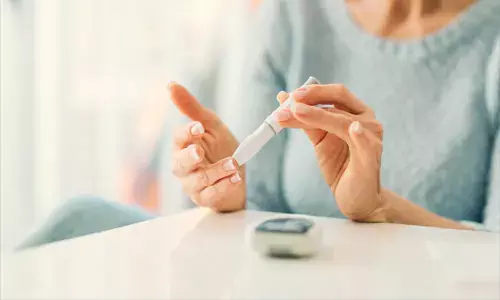- Home
- Medical news & Guidelines
- Anesthesiology
- Cardiology and CTVS
- Critical Care
- Dentistry
- Dermatology
- Diabetes and Endocrinology
- ENT
- Gastroenterology
- Medicine
- Nephrology
- Neurology
- Obstretics-Gynaecology
- Oncology
- Ophthalmology
- Orthopaedics
- Pediatrics-Neonatology
- Psychiatry
- Pulmonology
- Radiology
- Surgery
- Urology
- Laboratory Medicine
- Diet
- Nursing
- Paramedical
- Physiotherapy
- Health news
- Fact Check
- Bone Health Fact Check
- Brain Health Fact Check
- Cancer Related Fact Check
- Child Care Fact Check
- Dental and oral health fact check
- Diabetes and metabolic health fact check
- Diet and Nutrition Fact Check
- Eye and ENT Care Fact Check
- Fitness fact check
- Gut health fact check
- Heart health fact check
- Kidney health fact check
- Medical education fact check
- Men's health fact check
- Respiratory fact check
- Skin and hair care fact check
- Vaccine and Immunization fact check
- Women's health fact check
- AYUSH
- State News
- Andaman and Nicobar Islands
- Andhra Pradesh
- Arunachal Pradesh
- Assam
- Bihar
- Chandigarh
- Chattisgarh
- Dadra and Nagar Haveli
- Daman and Diu
- Delhi
- Goa
- Gujarat
- Haryana
- Himachal Pradesh
- Jammu & Kashmir
- Jharkhand
- Karnataka
- Kerala
- Ladakh
- Lakshadweep
- Madhya Pradesh
- Maharashtra
- Manipur
- Meghalaya
- Mizoram
- Nagaland
- Odisha
- Puducherry
- Punjab
- Rajasthan
- Sikkim
- Tamil Nadu
- Telangana
- Tripura
- Uttar Pradesh
- Uttrakhand
- West Bengal
- Medical Education
- Industry
Alendronate protects against type 2 diabetes development, study shows

Denmark: A recent study has revealed that alendronate may reduce the risk of type 2 diabetes with a potential 50% risk reduction after 8 years of alendronate use. The study was presented at the annual meeting of the European Association for the Study of Diabetes, held virtually from Sept. 28 to Oct. 1.
The study authors Rikke Viggers and Peter Vestergaard from Aalborg University Hospital, Aalborg, Denmark propose future clinical research to find if alendronate impacts glucose homeostasis, eg. glycemic control and insulin sensitivity, and if it is different for people with and without t pre- or type 2 diabetes.
Previous studies have suggested a link between glucose homeostasis and bone metabolism. Bisphosphonates are the first-line treatment of osteoporosis. Considering this, the study authors aimed to investigate if the risk of developing type 2 diabetes was altered by previous use of alendronate in a population-based case-control study.
For the study, all cases with a diagnosis of type 2 diabetes between 2008 and 2018 were matched with three randomly selected controls based on sex and age by incidence-density sampling. Data were included for 163,588 patients with type 2 diabetes and 490,764 matched controls.
Key findings include:
- The crude OR of developing type 2 diabetes after alendronate use was 0.93 and decreased further after adjustment (multiple adjusted OR: 0.64).
- The adjusted OR decreased to 0.47 among those with more than 8 years of alendronate use.
- A test for trend suggested a dose-response relationship between longer effective use of alendronate and lower risk of type 2 diabetes.
"These results suggest a possible protective effect of alendronate in a dose-dependent manner against the development of type 2 diabetes with a potential 50% risk reduction after 8 years of alendronate use," the authors wrote.
"Excitingly, our research suggests that alendronate, an inexpensive medicine widely used to treat osteoporosis, may also protect against type 2 diabetes," Viggers said in a statement. "We believe that doctors should consider this when prescribing osteoporosis drugs to those with prediabetes or at high risk of type 2 diabetes."
Reference:
Dr Kamal Kant Kohli-MBBS, DTCD- a chest specialist with more than 30 years of practice and a flair for writing clinical articles, Dr Kamal Kant Kohli joined Medical Dialogues as a Chief Editor of Medical News. Besides writing articles, as an editor, he proofreads and verifies all the medical content published on Medical Dialogues including those coming from journals, studies,medical conferences,guidelines etc. Email: drkohli@medicaldialogues.in. Contact no. 011-43720751


